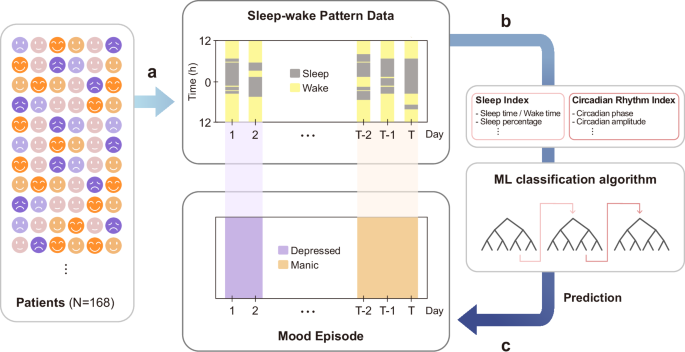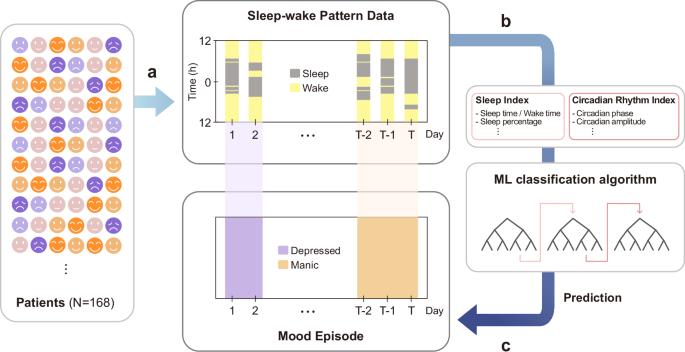利用可穿戴睡眠和昼夜节律特征准确预测情绪障碍患者的情绪发作
IF 12.4
1区 医学
Q1 HEALTH CARE SCIENCES & SERVICES
引用次数: 0
摘要
可穿戴设备能够被动收集睡眠、心率和步数数据,为情绪障碍患者的情绪发作预测提供了可能。然而,目前的模型通常需要多种类型的数据,限制了在现实世界中的应用。在此,我们开发了仅使用睡眠-觉醒数据预测未来发作的模型,这些数据可通过智能手机和可穿戴设备轻松收集,并根据个人的睡眠-觉醒历史和过去的情绪发作情况进行训练。通过对 168 名患者的纵向数据(平均临床随访 587 天,可穿戴设备数据 267 天)进行数学建模,我们得出了 36 个睡眠和昼夜节律特征。这些特征能够准确预测第二天的抑郁、躁狂和躁狂发作(AUC:0.80、0.98、0.95)。值得注意的是,每天的昼夜节律相位变化是最重要的预测因素:延迟与抑郁发作有关,提前与躁狂发作有关。这项前瞻性观察性队列研究(ClinicalTrials.gov: NCT03088657, 2017-3-23)表明,睡眠-觉醒数据与之前的情绪发作史相结合,可以有效预测情绪发作,加强情绪障碍管理。本文章由计算机程序翻译,如有差异,请以英文原文为准。


Accurately predicting mood episodes in mood disorder patients using wearable sleep and circadian rhythm features
Wearable devices enable passive collection of sleep, heart rate, and step-count data, offering potential for mood episode prediction in mood disorder patients. However, current models often require various data types, limiting real-world application. Here, we develop models that predict future episodes using only sleep-wake data, easily gathered through smartphones and wearables when trained on an individual’s sleep-wake history and past mood episodes. Using mathematical modeling to longitudinal data from 168 patients (587 days average clinical follow-up, 267 days wearable data), we derived 36 sleep and circadian rhythm features. These features enabled accurate next-day predictions for depressive, manic, and hypomanic episodes (AUCs: 0.80, 0.98, 0.95). Notably, daily circadian phase shifts were the most significant predictors: delays linked to depressive episodes, advances to manic episodes. This prospective observational cohort study (ClinicalTrials.gov: NCT03088657, 2017-3-23) shows sleep-wake data, combined with prior mood episode history, can effectively predict mood episodes, enhancing mood disorder management.
求助全文
通过发布文献求助,成功后即可免费获取论文全文。
去求助
来源期刊

NPJ Digital Medicine
Multiple-
CiteScore
25.10
自引率
3.30%
发文量
170
审稿时长
15 weeks
期刊介绍:
npj Digital Medicine is an online open-access journal that focuses on publishing peer-reviewed research in the field of digital medicine. The journal covers various aspects of digital medicine, including the application and implementation of digital and mobile technologies in clinical settings, virtual healthcare, and the use of artificial intelligence and informatics.
The primary goal of the journal is to support innovation and the advancement of healthcare through the integration of new digital and mobile technologies. When determining if a manuscript is suitable for publication, the journal considers four important criteria: novelty, clinical relevance, scientific rigor, and digital innovation.
 求助内容:
求助内容: 应助结果提醒方式:
应助结果提醒方式:


